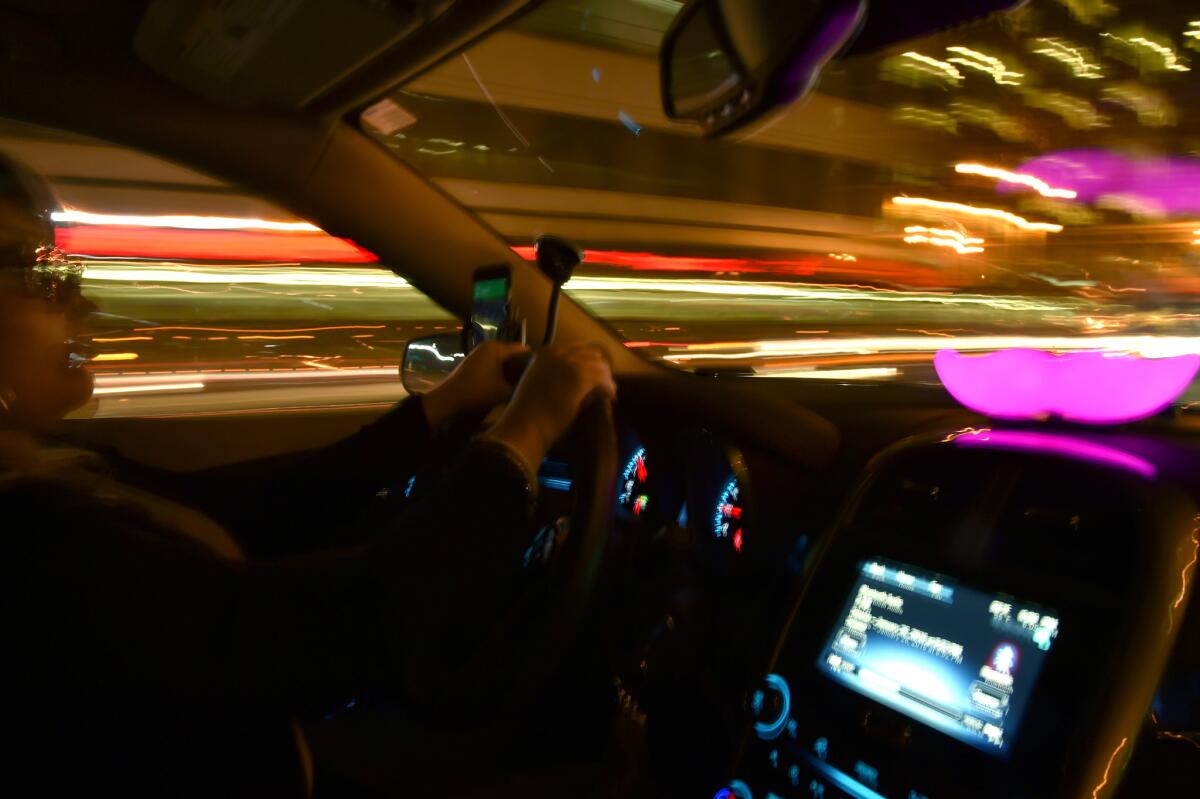Union-backed Lyft drivers object to $27-million settlement

- Share via
A handful of California Lyft drivers and a Teamsters-backed drivers’ alliance are seeking to squash a proposed $27-million settlement in a lawsuit against the ride-hailing app company.
The objectors have written to U.S. District Court Judge Vince Chhabria in recent days, saying the payout and contractual concessions to drivers are insufficient. They also expressed concern that the deal doesn’t address the most important issue: whether drivers for ride-hailing companies such as Lyft and Uber should remain independent contractors or be treated as employees, eligible for healthcare benefits and paid time off, among other provisions.
The union-backed objectors acknowledged that trying to resolve that question once and for all carries significant risks -- namely losing in trial. But they told the court that “the stakes for the state, the economy and the drivers themselves are much higher.”
That classification of app-centric workers has led to several legal battles across the country, including the 2013 class-action case against Lyft in Chhabria’s San Francisco courtroom. An estimated 100,000 drivers could be eligible for a portion of the $27 million based on how much they drove. About 40,000 drivers already have filed claims, according to Shannon Liss-Riordan, the lawyer representing the class.
She said Tuesday that worker classification remains highly contested and the settlement represents the best achievable outcome at this time.
“We’re doing what we can do to advance the workers’ rights,” she said. “Nothing about this settlement is a statement that the drivers are properly classified.”
But it does preserve Lyft drivers as independent contractors, potentially limiting their ability file future class-action lawsuits and collectively bargain with the company.
Labor-union groups including the Uber Lyft Teamsters Rideshare Alliance, Teamsters Joint Council 7 and Teamsters Joint Council 42 say that’s not OK.
“Lyft makes its profits by undercutting workers and taxpayers,” Joint Council 7 President Rome Aloise said in a statement. “This is an unfair settlement and drivers have earned more and deserve better.”
Lyft doesn’t generate profits, but it could soon, company president John Zimmer recently said.
The settlement was already upped from about $12 million earlier this year after Lyft submitted updated data about its business. The Teamsters group voiced objections about the agreement at that point too, but Chhabria said such issues were better addressed through legislation than court rulings.
It’s unclear how much sway the latest letters will have with Chhabria, who gave preliminary approval to the $27-million figure in June. A hearing for final approval is expected Dec. 1.
Lyft expressed confidence that the settlement would stand.
It “preserves the flexibility of drivers to choose when, where and for how long they drive, and enables consumers to continue benefiting from Lyft’s convenient, affordable rides,” the company said.
A similar case against Uber is now in jeopardy. U.S. District Court Judge Edward Chen rejected a $100-million settlement in the Uber drivers’ case in August. A month later, an appeals court in an unrelated case ruled Uber drivers must take their grievances to arbitration as opposed to the courts.
“We’re now picking up the pieces,” said Liss-Riordan, who’s also representing the Uber drivers.
Twitter: @peard33
ALSO
Lyft and Uber launch programs to cater to seniors
Lyft president predicts a driverless future, says Tesla has it all wrong
Lyft CEO has a plan that’s far bigger than ride-hailing




